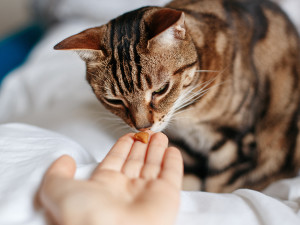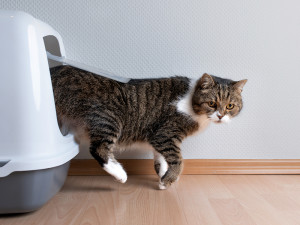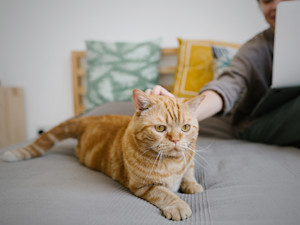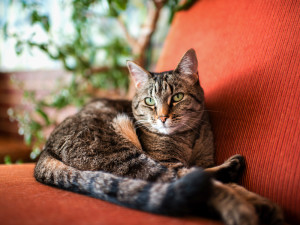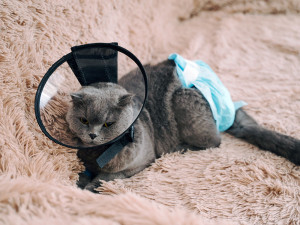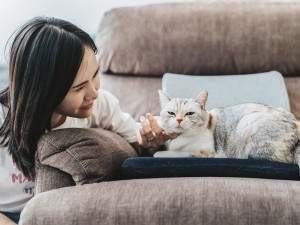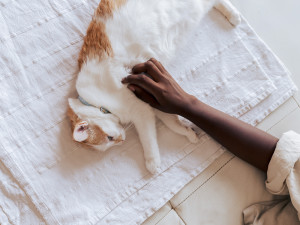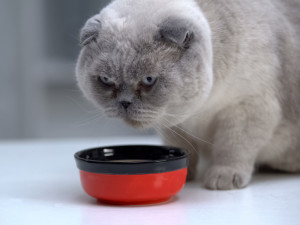Does My Cat Need Joint Supplements?
Your cat might just need a little boost to be back to their active self.
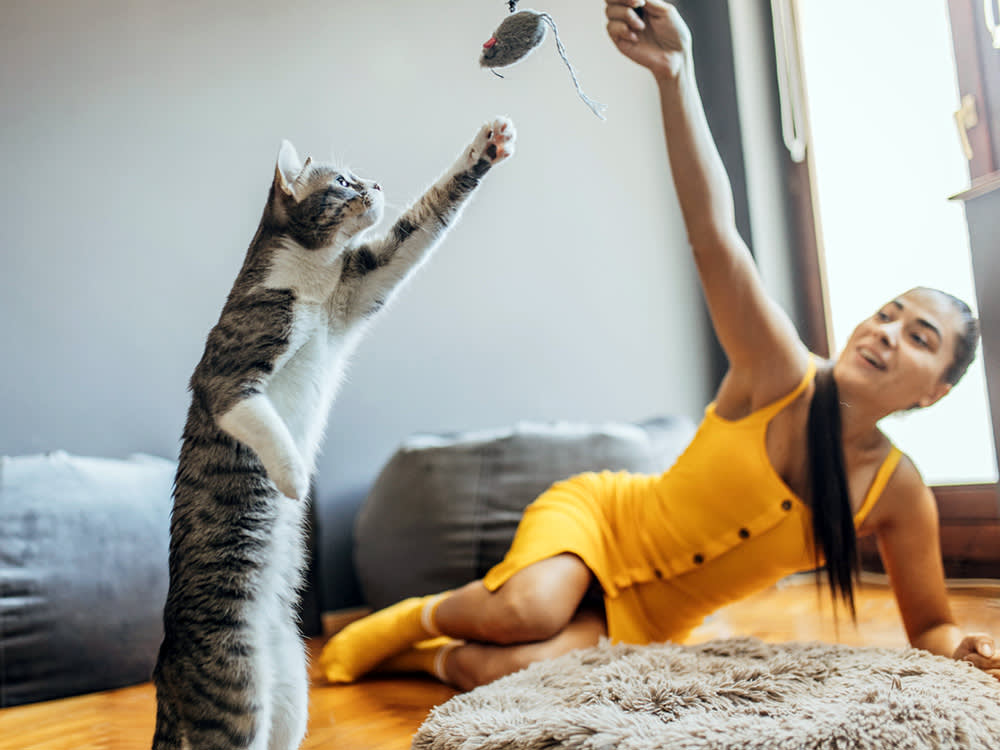
share article
In this Article:
What Are Joint Supplements For Cats?opens in a new tab Common Joint Problems in Cats Signsopens in a new tab Signs Your Senior Cat Needs Joint Supplementsopens in a new tab Benefits of Joint Supplementsopens in a new tab How to Choose the Right Joint Supplementopens in a new tab Cat Joint Health Tipsopens in a new tab
There are many reasons to consider adding a joint supplement to your cat’s daily regimen. First, it is important to know that the majority of cats will develop some degree of joint disease as they age. In a studyopens in a new tab conducted on cats over age 12, over 90 percent of them had signs of joint disease on X-rays, even if their pet parents did not perceive obvious signs of pain at home.
Cats are notorious for hiding their pain, and sometimes there are only subtle changesopens in a new tab in their behavior that hint at a bigger problem. Because we know joint disease may be under-diagnosed for this reason, starting a joint supplement can be a good way to slow advancing joint disease and ward off painful joints later in life.
Additionally, if your cat has a history of traumatic injury, such as being hit by a car or another accident that resulted in broken bones, torn ligaments, or spinal trauma, you should definitely consider joint supplements. Even if your cat has healed and seems fine now, these kinds of injuries set cats up for an increased risk of arthritis as they age. Being proactive and starting a joint supplement early on may help to slow the progression of arthritis.
What are joint supplements for cats?
There are many different joint supplements for cats, and they work in different ways. It’s also important to note that joint supplements fall into the category of nutraceuticalsopens in a new tab. As supplements, they are not regulated as stringently as prescription medications and are not required to be approved by the FDA for safety and efficacy.
This means there is a lot of variation out there when it comes to what you are actually buying and whether supplements actually do what they claim to do. It is very important to consult with your veterinarian to find reputable brands and to confirm proper dosage for your cat. Also be sure to check with your vet that the supplement you are considering is safe for your cat specifically and will not interfere with other medications or diet restrictions. Many joint supplements for cats will include some of the following ingredients:
Omega 3 Fatty Acids: These molecules of polyunsaturated fatty acids, sometimes referred to as PUFAs, are known to have powerful anti-inflammatory effects, especially fish oilopens in a new tab-derived eicosapentaenoic acid, thankfully abbreviated as EPA.
Glucosamine and chondroitin: These are two factors needed to rebuild damaged cartilage. They may have additional benefits including promoting the creation of collagen and joint lubricants, which help to keep the joints moving smoothly.
Microlactin: This is a specialized milk protein that reduces inflammation. It takes at least 14 days to reach peak effectiveness.
Avocado soybean unsaponifiables: The vegetable oils of avocados and soybeans contain sterols, which are being studied for their beneficial effects on cartilage. They seem to block certain inflammatory factors that can damage cartilage while also encouraging cartilage repair.
What are the common joint problems in senior cats?
The most common joint problems in senior cats result from osteoarthritis. This is a degenerative joint disease. Over a lifetime of normal wear-and-tear, the cushioning within the joint, including the cartilage and joint fluid, may start to break down, resulting in inflammation and changes within the joint. Other forms of joint disease can result from traumatic injuries, such as broken bones, dislocated joints, and/or damage to tendons or ligaments.
These injuries may affect the alignment of the joints, damage the cartilage, and increase inflammation as well. More unusual causes of joint injuries would be infection or immune-mediated disease within the joints, and joint dysplasias, where the joint is malformed, either at birth or secondary to injury. Many of these problems start earlier in life and advance gradually, causing more discomfort and mobility problems as cats age.
What are the signs that your senior cat may need joint supplements?
Cats are sneaky about showing their pain. This is in part because they are so small and agile that they can compensate well for minor injuries and continue their same level of activity despite the pain. It is also partly a behavioral strategy to avoid appearing weak and injured so they often hide their injuries for as long as they possibly can.
In many cases, you may not notice at all that your cat has arthritis. These supplements will be most helpful before your cat’s arthritis advances to a more extreme degree anyway, so starting them before you see obvious signs of pain is a great strategy. Some of the subtle symptoms of joint problemsopens in a new tab in cats could include:
Changes in behavior, such as avoiding affection, hiding, biting, or swatting when they are touched in certain areas can be signs of pain in cats.
Peeing/pooping outside of the litter boxopens in a new tab may occur if their mobility is limited or they are in pain and are having difficulty climbing in and out of the box. For some cats, this can also lead to constipation opens in a new tabif it hurts for them to poop.
Your cat might not self-groom as much if they are in pain or having trouble contorting themselves into cat pretzels to reach those hard-to-groom spots. Cats in pain may start to develop greasy or matted fur opens in a new tabas a result of not grooming themselves.
Decreased activity and jumping can also be a sign of pain or reduced mobility. If your cat suddenly stops jumping onto the counters or won’t climb their cat tree, it may be a sign of a joint problem.
Limping may be the most obvious sign of an injury or joint problem, but it is much less common in cats with joint problems. Cats will do everything they can to compensate and hide their pain so if they are visibly limpingopens in a new tab, you know they must be in a lot of pain. In that case, always see your vet right away; they may have a more serious acute injury and/or will need prescription pain medications to help relieve their pain.
What are the benefits of joint supplements for senior cats
The benefits of joint supplements for senior cats are that they can help to prevent arthritis from getting worse, improve mobility, reduce inflammation, and — in most cases — they can safely be used long-term. There are some pain medications that are very effective in cats but cannot safely be used long-term without risks of serious side effects.
If you are able to start joint supplements early, this can help your kitty to be comfortable and active without having to rely on more heavy-duty pain medications as often. In other cases, they may be a great compliment to those pain medications to help manage your cat’s pain using as many tools as possible.
How to choose a joint supplement for your senior cat
When selecting a joint supplement, it’s important to keep in mind what you hope to achieve as well as your cat’s specific condition. Because these supplements contain different ingredients, they each provide unique kinds of support. Some supplements are better for reducing inflammation while others help to repair cartilage.
Consult with your veterinarian to learn about the reputable cat joint supplements that are available and which ones would be best for your cat’s specific situation. If you plan to use a product that is not specifically marketed for cats, be sure to check with your vet that it’s safe and nontoxic since products intended for humans or dogs could be toxic to cats.
How to give your senior cat a joint supplement
If you’ve been lucky enough to avoid medicating your cat thus far, you may not be aware of the challenges in giving medication to catsopens in a new tab. Let’s just say, they are not known for their cooperative spirits. They have highly sensitive senses of smell and taste, so if the medication has a strong odor or bad taste, they will be on high alert immediately. Forget simply hiding it in their food and hoping they’ll eat it; they will smell it from the other side of the house and skip a meal rather than eat their medicine. Luckily, there are joint supplements that come in palatable chews that some cats will willingly eat.
Other times, supplements may be available in a liquid that can be given with an oral syringe. There are a few powdered supplements that do not have much flavor or odor and might be tolerated mixed into the food, but if your cat snubs the food more than once, move on to another strategy. You don’t want your cat to develop a food aversion and skip meals; this can quickly lead to other health problems. Finally, there are a few joint supplements that may be administered as an injection by your veterinarian, so if all else fails, speak with your vet about this alternative.
When should you talk to your veterinarian about joint supplements for your senior cat?
You should speak with your veterinarian if you are wondering if your cat would benefit from a joint supplement, if you are noticing any changes in your cat’s behavior or mobility, and/or if you have a cat who is approaching their senior years. It is always best to have your vet perform a thorough exam on your cat if you notice any changes.
Some cats with very painful conditions will need prescription pain medications to bring them relief, so a supplement may not be the best first step, but may be a good add-on once you get their pain under control. Other times, their pain or behavior changes could be a sign of other underlying medical problems that need to be addressed as well. Always check. It doesn’t hurt to ask and play it safe with your cat’s health.
Tips for keeping your senior cat’s joints healthy
There are many ways to tackle joint health at all ages and especially as your cat approaches their golden yearsopens in a new tab. If you have a healthy cat without any specific injuries or joint problems, prevention is the best approach. This includes keeping your cat at a healthy weight and taking measures to prevent obesity, which strains their joints.
Provide them with a balanced diet in controlled portionsopens in a new tab and give them lots of opportunity for exercise and play. For cats who have had injuries or other underlying conditions that may affect their joints, a multimodal approach to managing their pain and mobility is always best. This means using lots of different tools opens in a new tabto maximize their comfort, including prescription pain medications as needed, acupuncture, physical rehabilitation, massage, and/or supplements.
Some cats may also need you to make accommodations at home for their comfort; be sure to put their food and water in an easy-to-reach spot if they are having trouble jumping up high. If they cannot climb into their litter box, use a cut-down cardboard box with a very low edge instead (or consider a low-entry litter box), so they can step in and out more easily. If they love to sit on the window sill or sleep in your bed, consider purchasing pet stairs or a ramp so they can still access their favorite spots without having to jump.
FAQs (People also ask):
How long does it take for joint supplements to work?
This varies a lot depending on the supplement, but they may take many weeks to show effectiveness and only work when taken consistently. As soon as they are discontinued, their effects also wane.
Are there any side effects associated with joint supplements for cats?
Yes. This also depends on which supplement your cat takes, but they can cause digestive upset, such as vomiting or diarrhea, allergic reactions, as well as more specific effects based on the ingredients.
Are joint supplements suitable for all cats, or are they primarily for senior cats?
In many cases, they are suitable for all cats and some work best as preventatives, meaning they should be used early before they develop advanced joint disease. Because these medications can have side effects, it’s best to consult with your vet first in all cases.
Can joint supplements prevent joint issues in cats, or are they primarily for managing existing problems?
Yes, there are some supplements that may help to prevent joint issues by slowing the progression of disease and manage existing problems.
References:

Dr. Amy Fox, DVM
Amy Fox, DVM is a small animal veterinarian in New York City. A lifelong animal lover, Dr. Fox studied biology in college and then worked as a veterinary nurse before pursuing veterinary school at Cornell University. She has worked in many different settings including shelter medicine, emergency medicine, general practice, and animal cruelty and forensics. She is especially interested in nutrition, preventative medicine and care for senior pets. Dr. Fox also enjoys writing about veterinary medicine and teaching. In her free time she loves to cook, garden, and go for long runs.
Related articles
![Brown Gray Cat Lounging on Red Arm Chair Near Green Plant]() opens in a new tab
opens in a new tabCat Jumping Off the Literal Walls? They Could Have Hyperthyroidism
Everything you need to know about the common disease.
![Gray cat laying on a fuzzy pink blanket with a protective cone around its head and a blue diaper on]() opens in a new tab
opens in a new tab5 Best Cat Diapers of 2023
The top cat diapers to combat excitable urinators and leaking caused by incontinence, and help those recovering from surgery.
![A senior cat is held in their owner's lap]() opens in a new tab
opens in a new tabHow to Care for Your Senior Cat
From taking them to the vet more often to giving them a hand with grooming, older kitties need a little extra TLC.
![A woman petting her cat on the couch]() opens in a new tab
opens in a new tab6 Surprising Signs of Arthritis in Cats
They’re not what you’d think, according to veterinary behaviorist Dr. Margaret Gruen.
![Unrecognizable woman petting an ill cat]() opens in a new tab
opens in a new tabNow, Something No One Wants to Talk About: Cat Cancer
Veterinarian Dr. Alycia Washington breaks down the four most common types of cancer in cats, from how to spot the early signs to how to treat them.
![Cat eating out of a red bowl]() opens in a new tab
opens in a new tabDoes Your Diabetic Cat Need a Special Diet?
Get ready for a sigh of relief — this food doesn’t have to be pricey.
